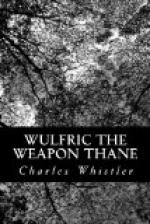It was full of treasure—gold ornaments, and chains wherein were set precious stones, and some gold coins and silver, and these were the least value of all. But little pleasure had I in them, for I knew too well how they came, and a thought came to me.
“Father,” I said, “this comes from ruined towns on yonder shore—take it and build up Bosham again. Aye, take it.”
“Why, my son, here is treasure enough to build three villages like ours,” he said quietly; “for timber houses cost but labour in this forest land, and there was naught else worth taking in the place.”
“But your people are the poorer,” I said; “I pray you take it for their need, and for a new bell, moreover.”
And so I urged him till he took the greatest gold chain, saying that in honesty he could no more, for that would surely make Bosham wish for more burnings if they turned out as this.
“Keep the rest and buy a new ship,” he said, “and forget not that always and every day your name will be remembered at the time of mass in Bosham; and that may help you in days to come.”
So he blessed me and departed, and I think that both of us were light at heart, save for parting. And I have never seen the good prior again, though his face and words I cannot forget.
Soon came one to lead me to the presence of the thane and his wife, and from them I found kindness more than I could have looked for. We broke our fast together, and then the lady asked me if I would accept horse and gear for my journey from her, for she had heard from the prior that I had been shipwrecked, who had also told her all the story of our doings at Bosham.
Thanking her, I told her that though shipwrecked, I was yet rich, having a store of wealth with me; for I thought that it was in the minds of these kind people that I was in need.
“Be not proud,” she said “bide with us for a while, and then take horse and go. We hold that you have deserved well of all of us.”
But I told her of my mother and sister at home, and how I would fain be back with them, so she pitied me the more, saying that now for their sakes she would hasten me.
“Aye, lad,” said the thane, “we have sons of our own at court, and the lady would that someone would pack them home on a good horse—so she must not be denied.”
Thus they persuaded me, and when I tried to thank them, the thane laughed, and the lady said:
“Thank me not but in one way, and that is by asking your mother to help homeward some other lady’s son when need is. And that is all I would wish.”
And the end of it was that I rode away from Chichester town on a good horse and with change of clothes in saddlebags, and those worthy people stood at the gate to give me good speed.
Yet that is not the end, for there are one or two who have ridden in like sort from Reedham since that day, and have borne home the like message; so that I know not where the ending of that kindly deed may be.




